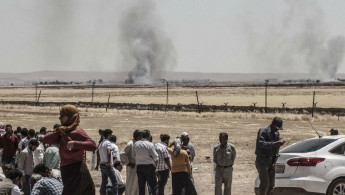The Islamic State group launches Ramadan offensive
Over the course of two days, the Islamic State group has launched significant attacks consistent with its military strategy and Abu Bakr al-Baghdadi's vision of building a global caliphate.
On Thursday, the northern Syrian town of Kobane was attacked by solo suicide bombers, a large carbomb and reportedly a bomber on a motorbike. The town, held by the Kurds, had successfully fought off a sustained onslaught by the jihadists earlier this year, thanks to allied aerial support and the tenacity of the Kurdish fighters.
Simultaneously, IS launched an attack on al-Hasakah, 170 miles east of Kobane. The city, which had a pre-war population of 190,000, is jointly held by the Syrian army and some pro-regime Kurdish forces.
IS militants detonated at least one car bomb at a Syrian army checkpoint there and have taken control of some neighbourhoods in the southern part of the city, according to the UK-based Syrian Observatory for Human Rights.
Global strategy of terror
| Make no mistake, IS and its self-proclaimed caliph have begun their Ramadan war in earnest. |
These two trademark attacks reflect the battlefield strategy within what IS calls the "Interior Ring", which includes Iraq and Syria.
The recent losses to the Kurds of the key Syrian town of Tal Abyad, just 70 miles from al-Baghdadi's putative capital of Raqqa, coupled with the loss of a former Syrian army base just 50 miles away from Raqqa, may have forced his hand somewhat.
But it was always on the cards that IS would use Ramadan to attempt to carry out his key command to "remain and expand", to hold territory already won and to expand that territory through further military action.
Hard on the heels of the Interior Ring offensive came near simultaneous attacks in the other two theatres of operation: the "Near Abroad" which includes the wider Middle East and North Africa, and the "Far Abroad" in Europe, Asia and the US.
At time of writing this, there have been two deadly attacks in the Near Abroad.
In Kuwait City, a suicide bomber blew himself up at the Shia mosque of Imam Sadiq, the first such attack in Kuwait's history. It is a country with little sectarian unrest.
IS, however, considers Shia Muslims heretics and seeks to promote sectarian hatred between Sunni and Shia. At least 24 people were killed in the mosque blast.
The second attack, on the Tunisian coastal tourist town of Sousse, targeted a beach and two hotels popular with Western tourists, thus striking a blow at the country's still struggling tourism sector.
Tourism is an essential part of Tunisia's economic recovery which, in turn, supports the country's largely peaceful post-Arab Spring transition to democracy.
A successful economy, run by a democratically elected moderate Islamist government poses what Baghdadi would regard as an intolerable threat to his grandiose vision of a caliphate.
At least 27 people have been killed in that assault.
Earlier on Friday came reports of an attack in the Far Abroad, in the southern French city of Grenoble where an industrial gas factory was attacked by what are believed to be two terrorists.
At least one person is dead, decapitated by a militant and his severed head hung from a gate in the signature barbaric style that the IS uses to promote its brutal cause.
It should be said that IS has not claimed responsibility for the French attack, and it has been reported that the victim was the suspect's boss - but the attack bore "all the hallmarks of a terrorist attack", according to French President Francois Hollande.
In the United States, the FBI has arrested at least eight individuals it believes were poised to carry out attacks on military, police and civilian targets.
Make no mistake then, IS and its self-proclaimed caliph have begun their Ramadan war in earnest, with engagements in what is for them all three theatres of a global war.
A ferocity born of desperation?
| So convinced are the jihadis they have been infiltrated, they attempt to explain away their reverses by deflecting blame. |
However, the timing and the ferocity with which they are carrying out the attacks may be a measure that all is not well within the jihadi camp.
Not only have they lost significant ground and fighters to the Kurds in northern Syria but they are sustaining heavy casualties from allied airstrikes.
So convinced are the jihadis they have been infiltrated and compromised, they attempt to explain away their reverses and failures with the tried and true method of deflecting blame.
The brutal execution of 15 "spies" - some by drowning in a cage, others with a rocket propelled grenade shot into a car, the rest by the detonation of explosives fixed around the necks of the victims - was the subject of a sick, slick IS propaganda video.
It was a warning perhaps aimed at its own jihadi fighters - but, more so, it may be an indication that Baghdadi's caliphate is now under severe pressure.
Others in the movement had reportedly advised him not to declare a caliphate too soon, as it would draw the attention of the world's greatest military power and the jihadis' greatest enemy, the US.
A caliphate brought too quickly to its knees by the Americans would damage the dream of global domination.
It is far too early to tell if Baghdadi is in trouble, but this summer may prove a decisive one in Syria, Iraq and beyond.
The summer will not come without heavy costs. Further attacks and battlefield assaults will mar this Ramadan, of that we can sadly be certain, leaving not just the Middle East, but the whole world in an anxious and uncertain frame of mind.



